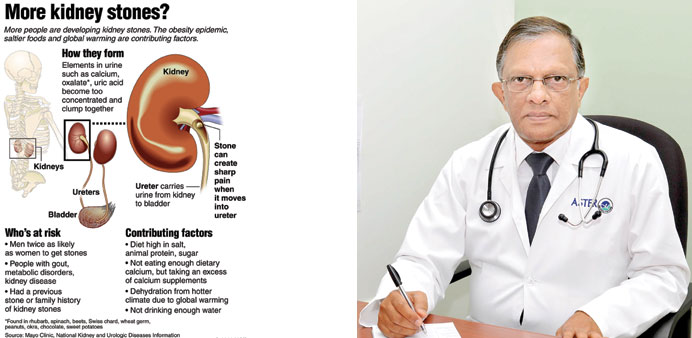By Dr Raju Abraham
If you have ever passed a kidney stone, you are not likely to forget the experience – it can be excruciatingly painful. Kidney stones are a fairly common disorder.
It often occurs when urine becomes too concentrated – causes mineral and other substances in your urine to form crystals. About 80% of stones consist of calcium and oxalate. Most other stones are composed of uric acid — end product of protein metabolism. Struvite stones result from urinary tract infection. Not all stones cause symptoms.
Usual symptoms
m Intensive colicky pain.
m Bloody or cloudy urine.
m Fever and chills.
Some of the substances filtered by the kidney — especially calcium, oxalate, uric acid and cystine — have the tendency to form crystals. Other substances such as citrate and magnesium help to prevent crystal formation. Normally those substances are in balance. Crystal formation can occur when too many of these elements or too little of the protective substances.
Crystal forms when the urine is too concentrated or is too acidic or alkaline.
Factors favouring kidney stones
m Heredity
m Diet
m Drugs
m Climate
m Lifestyle factors
Variety of Stones
m Calcium stones.
m Form 75 – 85% - usually combination of calcium and oxalate, causes increased calcium excretion in urine.
m Large amount of vitamin D increases calcium absorption.
m Thyroid hormone drugs.
m Drugs used to control increased urination.
m Uric acid stones
m Uric acid stone is a byproduct of protein metabolism. Seen in increased intake of meat or in gout.
m Struvite stones.
m Are seen in urinary tract infection.
Risk factor
m Family history.
m Age, gender and race.
m Certain diseases like – renal tubule acidosis, cystinuria.
m Certain medications – calcium-based antacids.
m Diuretics.
m Diet – high protein diet (meat)/fruits.
m Limited activity – bedridden patients.
Diagnosis
m Silent stones are detected by routine X-rays or ultrasound study for some other symptoms.
m CT is useful in some case.
m Treatment varies with the type of stones, you may be able to move a stone through your urinary tract simply by drinking plenty of water. Stones that cannot be detected with conservative method may have to be treated surgically, either by:
m ESWL (Extracorporial Shockwave Lithotripsy) – uses shockwave to break the stones into small crystals that are passed in your urine.
m PCNL (Percutaneous Nephro Lithotripsy) – when ESWL is not effective or the stone is very large.
m Ureteroscopic removals of the stones – for stones are which lodged in the tube.
Prevention
m Lifestyle changes.
m Research has shown that kidney stones can be prevented by making changes in the diet.
m Drinking more fluid.
m At least 10-15 ounce glass fluid especially water/ day is recommended. Cola beverages, coffee and tea should be limited to two ounces/day because these fluids contain oxalates — contributes in the growth of calcium and oxalate stones.
m More fluid maybe needed to stay hydrated in hot days or when you are active. Drinking lemonade made from fresh lemon or lemon juice may help reduce the risk of kidney stone formation.
m Lemon juice increases the level of citrate in the urine which in turn prevents the formation of kidney stones.
m Moderating salt consumption: Sodium increases the concentration of calcium and crystallation in urine (<2000 - 3000 mg/day). A table spoon of salt contains 2325mg of sodium.
m Eating a healthful amount of calcium: Ideally people should eat 1,200mg calcium each day preferably derived from food such as dairy products.
m Moderating conception of animal proteins: Eating too much animal proteins can lead to calcium and uric acid in the urine as well as low level of citrate in the urine which in turn favour calcium, oxalate, phosphate and uric acid stones.
m Moderating conception of oxalate rich food: Oxalate is found naturally in many fruits and vegetables. The highest amounts of oxalate are found in dark green leafy vegetables.
m Using vitamin carefully: Do not consume more than the 100% of the recommended daily dose for vitamin C, Vitamin D and calcium. Dietary supplements, especially calcium, should be taken with a meal to minimise the risk of forming a kidney stone.
m It can be especially helpful to drink more water, since low fluid intake and dehydration are major risk factors for urinary stone formation.

